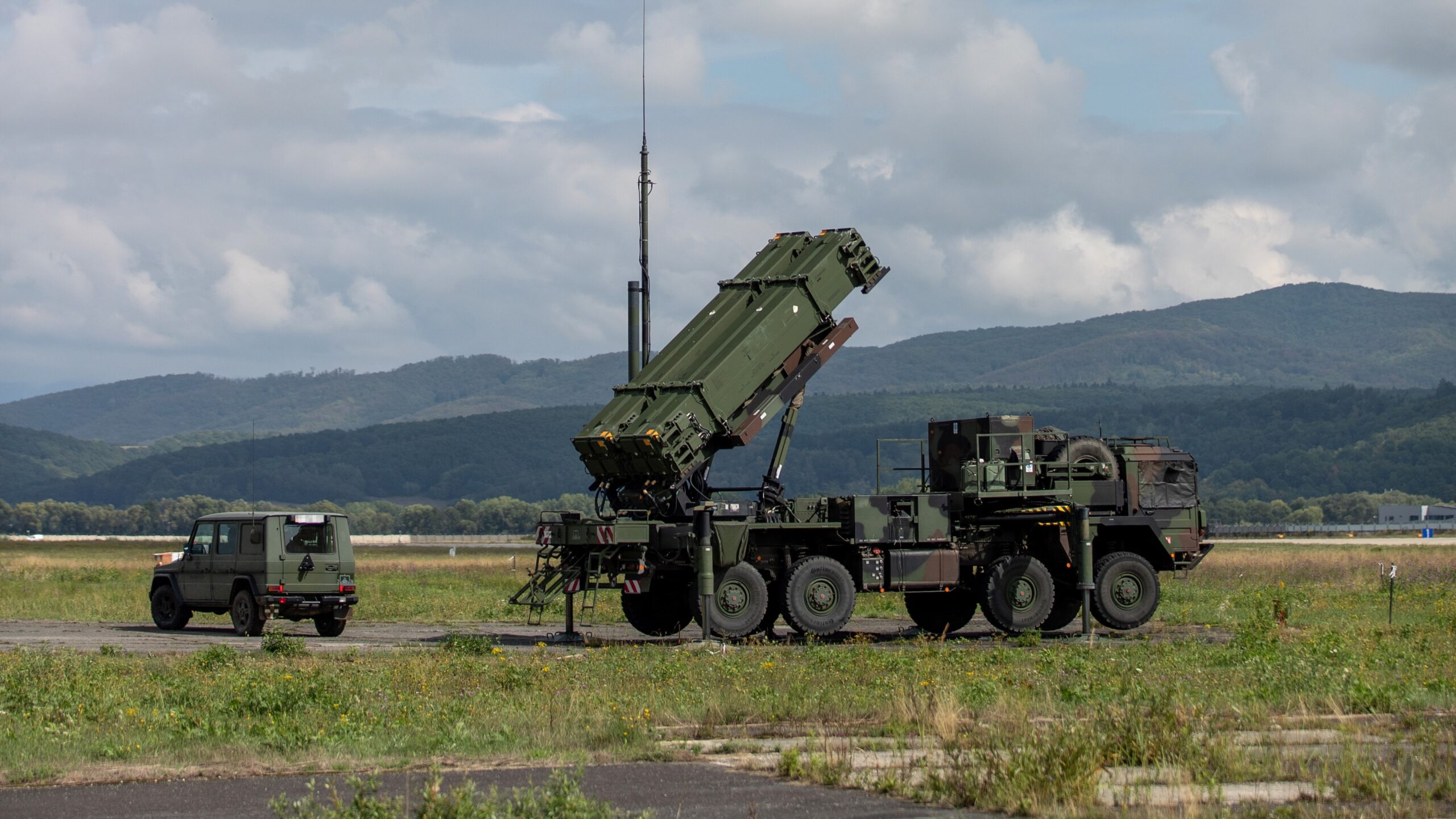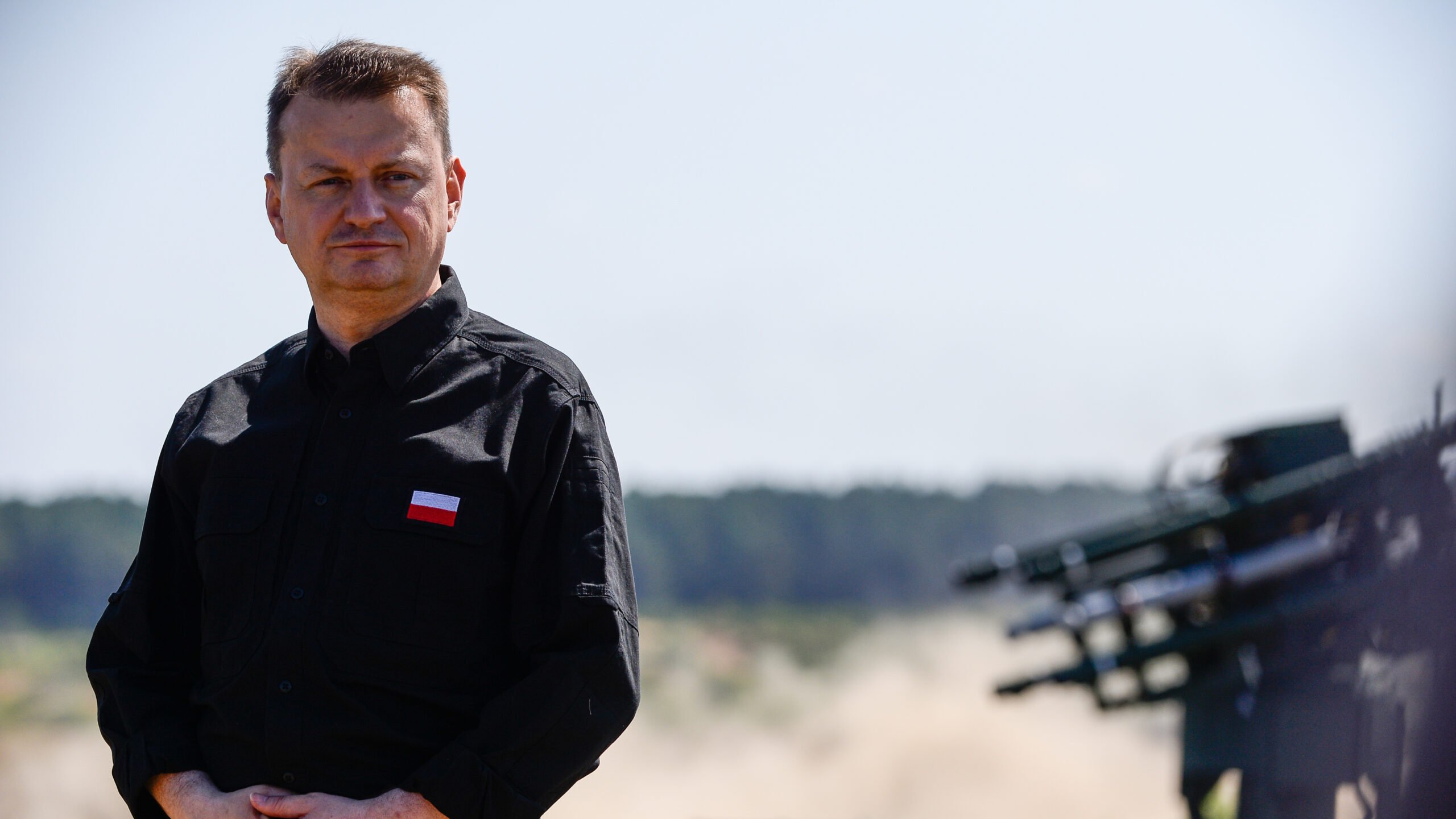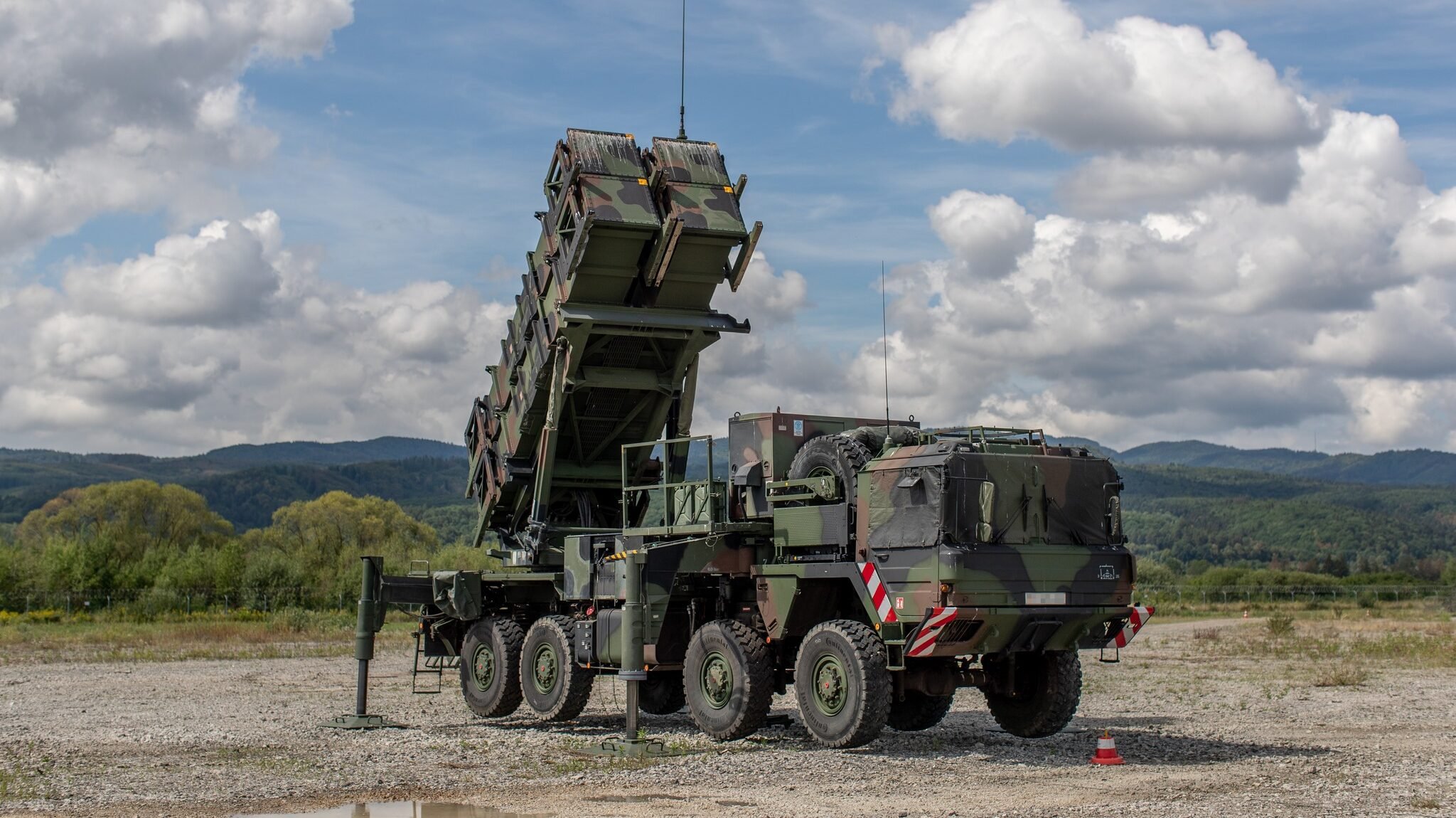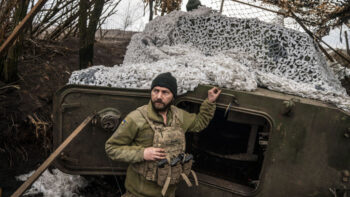
A Patriot launcher with PAC-3 missiles deployed to Slovak Air Force Base Sliač at the NATO mission Enhanced Vigilance Activities, August 23, 2022. (Bundeswehr/Tom Twardy)
WARSAW — After an initial acceptance of Germany’s proposal to deploy Patriot air defense systems to Poland to protect NATO’s airspace, Polish government officials are now pushing Berlin to send those defense systems to Ukraine instead. Now the seemingly unnecessary row with Germany — driven in part by internal politics in Warsaw — has turned into a major political issue between the countries.
On Nov. 21, Mariusz Błaszczak, Poland’s Deputy Prime Minister and Minister of National Defense, announced he was accepting a German offer to put Patriot systems inside Polish territory. The offer came following the mid-November incident in which an apparently Ukrainian-launched air defense missile crashed into Poland and killed two people.
Then two days later, Błaszczak threw a wrench into what appeared to be a done deal, announcing via Twitter that he wanted Germany to instead send the Patriots to Ukraine proper. “After further Russian missile attacks, I asked Germany to have the Patriot batteries offered to Poland transferred to Ukraine and deployed at its western border. This will protect Ukraine from further deaths and blackouts and will increase security at our eastern border,” Błaszczak wrote.
The move echoed comments made by the ruling Law and Justice party (PiS) leader Jarosław Kaczyński, who told the Polish Press Agency that same day that “I think that for Poland’s security it would be best if the Germans gave this equipment [Patriot systems] to Ukrainians, trained Ukrainian crews, with the proviso that the batteries would be located in the western Ukraine. Then it would probably allow shooting the opponent’s missiles more effectively than with the S-300 [SA-10 Grumble long-range surface-to-air and anti-ballistic missile system].”
Błaszczak’s public statement was not apparently consulted with Poland’s President Andrzej Duda. The head of the office of President, Paweł Szrot, said in an interview with wp.pl after the defense minister’s statement that in the president’s opinion, “if these rockets are transferred in some form by Germany, regardless of where they will be stationed, they should protect primarily Polish citizens and Polish territory. If Błaszczak has a different concept, he will have to convince the president to this. There have been no conversations in this matter yet.”
RELATED: Top Polish general: No need for Ukrainian forces to change tactics near border
And yet, within 48 hours, Duda himself endorsed the idea, saying in a news conference that “From a military point of view, of course, it would be best if these rocket systems (Patriot air defense units) were stationed in Ukraine, close to the Polish border to also protect Polish territory. Then they would protect and help protect both Ukraine and Poland most effectively. But the decision rests with the German side.”
The idea of moving Patriots into Ukraine hit immediate pushback from Berlin, with the German government making it clear that the Patriot systems are intended for use on NATO territory only. “These Patriots are part of NATO’s integrated air defense, meaning they are intended to be deployed on NATO territory. Any use outside NATO territory would require prior discussions with NATO and the allies,” German Defence Minister Christine Lambrecht said in Berlin.
That was echoed by Germany’s ambassador in Poland, Thomas Bagger, in interview for Polish daily Rzeczpospolita, who said “Germany presented this offer to Poland in good faith, as a committed ally of Poland.” But “the Polish answer, which was given to us on [Nov. 23] evening by the letter and through the Twitter account on the Minister Błaszczak, is difficult to understand. The Polish government knows the difference between the territory belonging to NATO and one that does not belong to the Alliance. And these Patriots are part of the NATO defense potential. Using them besides this area is simply not realistic now. Patriot batteries have to be manned by German soldiers. That is why the difference between NATO territory and everything that lies outside its borders is so important,” Bagger noted.
“Poland could have a significant impact on the German debate on policy towards Russia, but this requires a constructive approach from Warsaw,” he added.
Why would Duda, Błaszczak and other picks a fight with Germany, at a time when Berlin was offering to greatly boost Poland’s air defenses? The answer, as it often does, may come down to internal politics.

Polish minister of Defense Mariusz Błaszczak speaks to the media during a live fire exercises during the multinational DEFENDER Europe 20 military exercises at the Drawsko Pomorskie training grounds on August 11, 2020. (Omar Marques/Getty Images)
In Poland, critics of the populist ruling party, PiS, accused it of sacrificing the country’s security with a war next door in Ukraine for the sake of a domestic political struggle which exploits anti-German sentiment for short-term gain. And indeed, PiS has made hitting Germany a key part of its nationalistic drive ahead of next year’s presidential election.
On Sept. 1, the 83rd anniversary of Nazi Germany’s 1939 invasion of Poland, the Polish government — led by PiS — officially launched a campaign to seek war reparations from Berlin for the devastation caused by the country’s 1939-45 occupation. (A 2019 PiS report claimed the losses suffered amounted to a colossal 6.2 trillion złotys, roughly around €1.3 trillion, three times Germany’s annual state budget.) In October, Polish Foreign Minister Zbigniew Rau officially filled a note demanding Berlin pay reparations to the tune of €1.3 trillion.
Berlin insists the reparations issue was settled decades ago and nothing is now owed. But Poland’s right-wing ruling party has been pushing on the issue of war reparations, both to stir up supporters and to attack the liberal-centrist Civic Platform (PO) opposition for allegedly colluding with foreign powers to undermine the Polish government. Lining Berlin up as the bad faith actor may play into the PiS narrative that the Germans are historically unable to be trusted.
Kaczyński, the PiS party chief, underlined that attitude on Nov. 28, when he stated that “based on Germany’s previous behavior it is doubtful that Germany would shoot at incoming Russian missiles” — another direct shot at Berlin.
“The right-wing government in Poland and its leading party PiS (Law and Justice) has been for years very critical of Germany’s policies in many respects — including in defense,” Marek Świerczyński, a defense analyst at Polityka Insight, a policy analysis firm in Warsaw, told Breaking Defense.
“In their campaign before next year’s general elections, which they’ve already launched, they’ve made even sharper turn against Germany, to the extent that they denounce Poland’s NATO ally of promoting Russian interests and supporting Putin’s war with Ukraine,” he continued. “It is in this backdrop that Poland’s government has effectively rejected the German offer of Patriot deployment.”
But Does It Even Make Sense?
Putting politics aside, is there merit to the idea of putting Patriots in Ukraine, rather than Poland?
“From many points of view it would be good if the Patriot batteries were deployed in a distance from the Polish border, because then they would protect the territory of Poland, our citizens and part of Ukraine, but if there is no consent to this, let them be here (in Poland) and protect us,” Duda wrote on Twitter.
The tactical benefits were echoed by Yuriy Ihnat, spokesman for the Air Forces Command of the Armed Forces of Ukraine said that the deployment of Patriot systems in the west of Ukraine would strengthen the security of the airspace of both Ukraine and the whole Europe.
“And why in Poland? You can deploy it in western Ukraine. This will of course help, the system has a range of over 100 kilometres… The system could potentially strengthen the defense of Ukrainian skies,” Ihnat said, as cited by the RBK-Ukraine news portal.
On the sidelines of NATO Tumak-22 exercise, which involves 2,000 soldiers from land and air forces in northern Poland, Błaszczak took a swipe at Berlin by saying he was surprised by the idea that the German Patriots might be too advanced to be transferred to Ukraine.
“Another argument, which I take with surprise, is that, according to those preparing this thesis, German Patriots are too technologically advanced to be transferred to Ukraine. First of all, German Patriots are an old version, this is a version from the 1980s, so it cannot be said to be technologically advanced. Polish Patriots [to have Initial Operational Readiness in mid-2023] are technologically advanced and this is the latest version of Patriot,” said Błaszczak.

German Air Force’s Patriot air defense missile system are deployed to Slovakia. (Bundeswehr / Tom Twardy)
“Another argument, ladies and gentlemen, is that many equipment much more technologically advanced than German Patriots has already been donated to Ukraine. I am thinking about Himars or even NASAMS. So the claim that old German Patriots are more technologically advanced than the equipment that has been handed over is simply a false claim,” he continued.
However, those comments are not truly accurate. German Patriots are not old, and still are being upgraded. In July 2019 the US State Department approved the sale of PAC-3 advanced missiles for Germany, and almost one year later, the NATO Support and Procurement Agency (NSPA) signed a €25 million value contract with COMLOG Gesellschaft für Logistik mbH, for the upgrade and re-certification of 170 German PAC-2 missiles, from configuration level Anti-Tactical Missile (ATM) to Guidance Enhanced Missile – Tactical Ballistic Missile (GEM-T) level.
According to Raytheon, PAC-3 system upgrades continue under the International Engineering Services Program (IESP) which includes all countries that rely on Patriot for integrated air and missile defense — as of 2022, that includes the US, the Netherlands, Germany, Japan, Israel, Saudi Arabia, Kuwait, Taiwan, Greece, Spain, South Korea, United Arab Emirates, Qatar, Romania, Sweden, Poland, and Bahrain.
“Locating the German Patriots system in Ukraine is beneficial for the safety of the east part of our country, the south-east part of our country because anti-missile safety in western Ukraine means safety in Poland as well,” Błaszczak stressed.
According to Polish media Warsaw is waiting for the US opinion regarding the proposal to transfer German Patriots to Ukraine. And the matter will likely be on the table during the Nov. 29-30 meeting of NATO foreign ministers in Romania.
Ahead of the meeting, Polish Permanent Representative at NATO, Ambassador Tomasz Szatkowski, in interview for Polish Radio, pushed back at the idea NATO, and not Berlin, would have final say over placement of the weapons.
“Germany is a supporter of such an approach in which NATO is not formally involved in the decision-making process related to supporting Ukraine,” he said on Nov. 28. “In recent months we have often heard from Berlin that there is an agreement between NATO members not to send equipment [to Ukraine] … This is absolute untrue. No such arrangements have been made by NATO, unless some closed conversations could have between some allies that I don’t know about.”
Polityka Insight’s Świerczyński noted that the issue will certainly be a major focus this week — and could potentially have longer implications for other NATO allies when it comes to Poland.
“First of all, the topic is still under discussion — as recently as on Tuesday [Nov. 29] the presidential office in Warsaw (which seems to be acting as an adult in the room in all this commotion) said that they were pushing the defense ministry to accept the deployment,” he said. “Second, if not Poland, the Romania might benefit from the German offer, if talks between Warsaw and Berlin collapse ultimately.
“Third, the whole issue — the manner in which it was ill-managed by the Polish authorities — has not passed unnoticed among other allies and not to the benefit of Poland. There can also be an element of, say, mediation — be it from the NATO HQ or the US,” he added.
Norway’s top officer on his ‘biggest challenge,’ next frigate and new NATO neighbors
Gen. Eirik Kristoffersen, Norway’s Chief of Defense, talks to Breaking Defense about his plans for spending on new frigates and subs, the challenges of upgrading Norway’s “digital backbone” and refilling the military’s stocks.


























